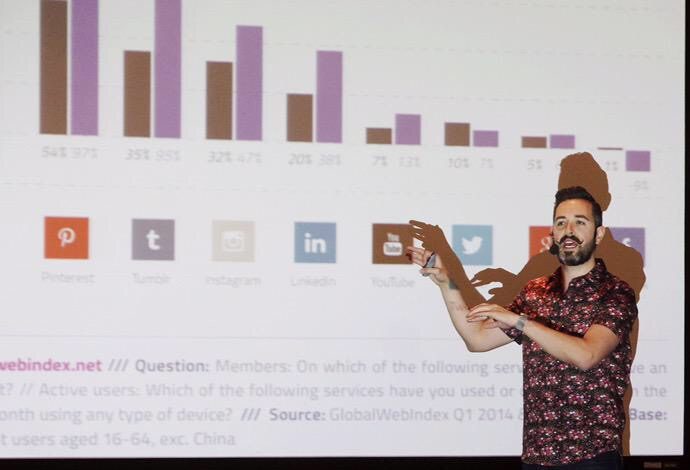Posts Tagged "Online Visibility"
Articles
- Best Marketing Conference Sponsorship
- What Does it Mean to Be an Exhibitor at a Conference?
- What Is the Biggest Social Media Conference?
- What Is an Innovation Conference?
- What Is a Typical B2B Event?
- What Are the Cloud Technology Events in 2025?
- Marketing Event Volunteer Opportunities: A Comprehensive Guide
- Digital Marketing Event Volunteer Opportunities Near Me
- What Does a Volunteer Do at a Conference?
- Is DigiMarCon Worth It?
- Is DigiMarCon Good?
- What is the Biggest Marketing Forum?
- What are Digital Marketing Conferences?
- Marketing Conference Exhibiting: Your Guide to Success
- Digital Summit Comparison: A Closer Look at DigiMarCon
- Digital Marketing Conference
- Digital Marketing Events: Your Guide to Success in 2025
- Marketing Conferences: Unlocking Your Business Potential in 2025
- What Is The Future of Digital Marketing in 2030?
- B2B Event Marketing Strategy: Unlocking Success For Your Business
- Why B2B Event Marketing?
- What Should a B2B Marketing Strategy Include?
- Top Marketing Conferences for 2025
- What Is the Future of Marketing in 2025?
Digital Marketing Conferences
- NORTH AMERICA
- DigiMarCon Cruise
(New Orleans, LA, USA) - DigiMarCon West
(Los Angeles, CA, USA) - DigiMarCon Northwest
(Seattle, WA, USA) - DigiMarCon Canada West
(Vancouver, BC, USA) - DigiMarCon Canada
(Toronto, ON, Canada) - DigiMarCon Canada East
(Montreal, QC, Canada) - DigiMarCon Florida
(Orlando, FL, USA) - DigiMarCon Gulf Coast
(Houston, TX, USA) - DigiMarCon Southern California
(San Diego, CA, USA) - DigiMarCon Midwest
(Chicago, IL, USA) - DigiMarCon Mid-South
(Nashville, TN, USA) - DigiMarCon Great Lakes
(Detroit, MI, USA) - DigiMarCon North
(Minneapolis, MN, USA) - DigiMarCon Central
(Kansas City, MO, USA) - DigiMarCon Texas
(Dallas, TX, USA) - DigiMarCon New England
(Boston, MA, USA) - DigiMarCon Mid-Atlantic
(Philadelphia, PA, USA) - DigiMarCon South Florida
(Miami, FL, USA) - DigiMarCon Southeast
(Atlanta, GA, USA) - DigiMarCon Central Florida
(Tampa, FL, USA) - DigiMarCon East
(New York, NY, USA) - DigiMarCon South Atlantic
(Charlotte, NC, USA) - DigiMarCon America
(Washington, D.C. USA) - DigiMarCon Northern California
(San Francisco, CA, USA) - DigiMarCon Rocky Mountains
(Denver, CO, USA) - DigiMarCon South
(San Antonio, TX, USA) - DigiMarCon Silicon Valley
(San Jose, CA, USA) - DigiMarCon Orange County
(Anaheim, CA, USA) - DigiMarCon Southwest
(Phoenix, AZ, USA) - DigiMarCon World
(Las Vegas, NV, USA)
- DigiMarCon Cruise
- LATIN AMERICA
- EUROPE
- MIDDLE EAST
- AFRICA
- ASIA PACIFIC
- DigiMarCon Hawaii & Pacific
(Honolulu, HI, USA) - DigiMarCon Asia & Japan
(Tokyo, Japan) - DigiMarCon New Zealand
(Auckland, New Zealand) - DigiMarCon Australia
(Sydney, Australia) - DigiMarCon Oceania
(Melbourne, Australia) - DigiMarCon Southeast Asia
(Singapore) - DigiMarCon India
(New Delhi, India) - DigiMarCon North Asia & China
(Shanghai, China)
- DigiMarCon Hawaii & Pacific
- VIRTUAL
Digital Marketing Blog
- What Makes DigiMarCon Stand Out (And Is It Worth It?) October 30, 2025
- Is DigiMarCon Worth Attending? A Complete Breakdown October 29, 2025
- DigiMarCon for Startups: Why Founders Shouldn’t Miss It October 29, 2025
- DigiMarCon Recap: What Went Down and What’s Next October 29, 2025

































Unlock the Power of Local SEO for Your Business
In today’s digital world, businesses must boost their online presence to draw in local customers. The right strategies can help you climb search rankings, bring in more customers, and boost sales.
As a digital marketing expert, knowing how to optimize for local search is key. It helps businesses succeed in their local areas. By using local SEO, you can outdo rivals and meet your goals.
Key Takeaways
What is Local SEO?
More and more people use online searches to find local products and services. This makes local SEO very important. It helps websites rank higher in local search results.
For businesses with physical locations, local SEO is key. It helps them reach customers in their area. By improving their online presence, businesses can get more people to visit their stores.
Definition and Importance
Local SEO uses strategies to make websites more visible in local search results. It involves optimizing content, structure, and coding. It also includes building local citations and creating content for the local audience.
Local SEO connects businesses with local customers. By showing up in local search results, businesses can get more online visibility. This leads to more website traffic and higher sales.
Key Differences From Regular SEO
Regular SEO aims to improve a website’s visibility globally. But local SEO services focus on specific areas. They use location-based keywords and create local content.
Local SEO also emphasizes local citations and reviews. These are important for local search rankings. Encouraging customers to leave reviews is a big part of local SEO.
Why Local SEO Matters for Your Business
For businesses of all sizes, local SEO strategies are now essential. With more people using online searches for local products and services, a strong local SEO can make a big difference. It can help your business be seen by potential customers or be missed.
Local SEO is key for small businesses. It lets them compete fairly with big companies. By improving their online presence for local searches, small businesses can get more people to visit their stores. This can lead to more sales.
Benefits for Small Businesses
Small businesses gain a lot from good local SEO. Some main benefits are:
By using local SEO strategies, small businesses can be seen by people looking for what they offer right when they need it.
Impact on Customer Acquisition
Local SEO’s effect on getting new customers is huge. By showing up in local search results, businesses can attract more people to their websites and stores. This increases the chance of turning these visitors into customers.
Also, a good local SEO plan can make customers more loyal. Businesses can connect with their customers better through online platforms.
How to Optimize Your Google My Business Listing
A well-optimized Google My Business listing can make your business easier to find. It helps customers discover and interact with your business.
First, claiming and verifying your Google My Business listing is key. It ensures your business info is correct and lets you control how it appears online.
Claiming Your Listing
Claiming your Google My Business listing means verifying your business info. Google uses this process to confirm your business’s authenticity. It’s vital for local SEO, helping Google know your business’s location and relevance.
Best Practices for Photos and Descriptions
After claiming and verifying, optimize your listing with great photos and descriptions. High-quality photos show off your products, services, and business. They give potential customers a visual idea of what you offer.
For photos, keep these tips in mind:
Your business description should be engaging and informative. It should highlight your unique selling points and services. By following best local SEO practices, you can improve your online presence and attract more customers.
Optimizing your Google My Business listing and following local SEO agencies guidelines can boost your local search rankings. Regular updates and engaging with customer reviews can also increase your visibility.
Understanding Local Keywords
As a local SEO expert, finding the right local keywords is key. These are terms people use to find products or services near them. Knowing these keywords helps in creating a strong local SEO plan.
Tools for Keyword Research
Businesses can use many tools to find local keywords. Google Keyword Planner, Ahrefs, and SEMrush are popular choices. They help analyze search volume, competition, and bid prices, guiding local SEO efforts.
Key features to look for in keyword research tools include:
Incorporating Keywords into Your Content
After finding local keywords, it’s time to add them to your content. This includes your website’s pages, meta tags, and headings. It’s important to use keywords naturally and avoid stuffing them, as this can harm your search rankings.
Best practices for incorporating local keywords include:
By understanding and using local keywords well, businesses can improve their local SEO. This makes it easier for local customers to find them online.
Building Local Citations
For businesses, having a strong online presence is key. Local citations help a lot with this. They are online mentions of a business’s name, address, and phone number. These citations boost a business’s visibility in local search results.
Citation Fundamentals
Citations are digital references to a business. They help search engines know if a business is real and legit. Consistency is key here; the business’s name, address, and phone number (NAP) must match everywhere.
There are two main types of citations. Structured citations are in local business directories like Yelp or Google My Business. Unstructured citations show up in blog posts, news articles, or other online content.
Tools for Citation Creation
Creating local citations can be easier with the right tools. Here are some popular ones:
Using these tools and focusing on quality, consistent citations can greatly help local SEO. This can also bring more visitors to a business’s website.
Importance of Online Reviews
In today’s world, online reviews are key for a business’s online image, mainly in local searches. As people look to reviews to decide, it’s crucial for businesses to grasp the value of online reviews in local search optimization.
Impact on Search Rankings
Online reviews affect how visible a business is in local search results. Search engines like Google look at the number, quality, and when reviews were posted. A business with lots of positive, recent reviews is more likely to show up first in search results, boosting its local SEO services.
Reviews and search rankings are connected in many ways. Reviews not only make a business seem more credible but also get more clicks from search results. More clicks mean search engines see a business as relevant and trustworthy, which helps it rank higher.
Strategies for Encouraging Positive Reviews
To make the most of online reviews, businesses need to get good at getting positive feedback. One smart way is to offer top-notch customer service. This makes sure customers are happy and more likely to leave a good review.
By using these tactics, businesses can improve their online image, boost their local search optimization, and draw in more customers through good word-of-mouth.
Leveraging Social Media for Local SEO
Social media is a strong tool for businesses wanting to boost their local SEO strategies. By connecting with their local audience and promoting their offerings, businesses can grow their online presence. This can lead to more sales.
Best Platforms for Local Engagement
Each social media platform reaches different people in different ways. For local SEO, finding the right platforms for your audience is key.
Tips for Local Content Creation
Creating content that speaks to your local audience is vital. Here are some tips:
By using these strategies, businesses can improve their local SEO on social media. This can bring more local traffic and sales. Working with a top local SEO company can help even more.
The Role of Mobile Optimization
Most local searches happen on mobile devices now. So, making your website mobile-friendly is key for local SEO success. Your site should be easy to use and look good on phones and tablets.
Importance of Mobile-Friendliness
A mobile-friendly website is no longer a luxury, but a necessity for businesses aiming to attract local customers. Google’s algorithms favor websites that work well on all devices. Making sure your site is mobile-friendly can boost your local search rankings.
To make your site mobile-friendly, follow these tips:
Local SEO and Mobile Search Trends
Knowing mobile search trends is crucial for local SEO. People searching for local businesses on their phones often buy or visit. So, optimizing for mobile can really help your business.
Some important trends to keep up with include:
By focusing on mobile optimization and keeping up with trends, businesses can improve their local SEO. Working with a top local SEO agency can help you use best local SEO practices for your business.
Analyzing Your Local SEO Performance
To see how well your local SEO is doing, you need to check it often. Look at important numbers and use tools to find what needs work. This helps you make smart choices to boost your online presence.
Metrics to Monitor
There are key numbers to watch when checking your local SEO. These include:
Tools for Analysis
To really understand your local SEO, you need the right tools. Some top tools are:
With these metrics and tools, a local SEO expert can help you improve local SEO and get more online visibility.
Engaging with Your Community
Local SEO is more than just being online; it’s about being part of the local scene. Getting involved in your community can really boost your business’s image and visibility. By taking part in or organizing local events, and forming partnerships, you can build a stronger bond with the people around you.
Hosting Local Events
Hosting events is a great way to connect with your community. These can be anything from workshops and seminars to charity events. They not only give back to your customers but also let you show off your skills and gain trust.
For example, a bakery might host a baking class, while a tech company could hold a seminar. Such events make your brand a valuable part of the community’s life.
Sponsorships and Partnerships
Working with other local businesses or groups is another smart move. By teaming up with businesses that complement yours, you can reach more people and improve your local SEO. For instance, a gym could team up with a health food store for joint deals.
This benefits both businesses and adds more value to the community.
Sponsorships can also go to local sports teams, cultural events, or charities. This makes your business even more rooted in the community. The important thing is to be sincere and choose partners that match your brand and appeal to your audience.
Staying Updated with Local SEO Trends
The digital world is always changing, and keeping up with local SEO trends is key for businesses. Search engines like Google update their rules often. This means businesses must stay current to stay ahead.
To attract local customers, businesses need to adapt quickly. They should learn about the newest local search optimization trends. Then, they can use effective local SEO services in their marketing plans.
2023 Trends to Watch
Several important trends are shaping local SEO in 2023. These include:
Resources for Staying Informed
To keep up with local SEO trends, businesses have many resources. These include:
By keeping up with trends and using these resources, businesses can improve their local SEO services. This will help them stay competitive in their local markets and reach their goals.
Conclusion: Taking Action on Your Local SEO Strategy
Creating a solid local SEO plan is key for businesses to thrive in their local areas. By using smart local SEO tactics, companies can boost their online visibility. This leads to more sales and keeps them ahead of rivals.
Creating a Coherent Plan
A good local SEO strategy means optimizing your Google My Business listing and building local citations. It also involves using social media to your advantage. Working with a trusted local SEO company is essential to make sure your plan fits your business perfectly.
Next Steps for Your Business
To elevate your local SEO, focus on making high-quality, local content. Also, get involved in your community through events and sponsorships. This approach will help draw in more local customers and grow your business.
FAQ
What is local SEO, and why is it important for my business?
Local SEO helps your business show up in local searches. It’s key for businesses with a physical spot. It boosts your search ranking, brings in more customers, and grows sales.
By making your online presence local-friendly, you can beat big companies. This way, you attract more people to your business.
How do I optimize my Google My Business listing for local SEO?
To boost your Google My Business listing, first claim it. Then, make sure your business info is correct. Use great photos and write a detailed description.
Also, answer customer reviews quickly. Use the right keywords in your description. This will help more people find you online.
What are local citations, and how do they impact local SEO?
Local citations mention your business’s name, address, and phone number online. They’re vital for local SEO. They tell search engines where you are and if you’re relevant.
Getting your business listed on good directories can boost your online visibility. This drives more people to your site.
How do online reviews affect my local SEO rankings?
Online reviews greatly affect your local SEO. They show search engines your business is reliable. Positive reviews and quick responses to feedback can improve your ranking.
This attracts more customers to your business.
What are some effective local SEO strategies for small businesses?
Small businesses can use several local SEO tactics. Start by optimizing your Google My Business listing. Then, build quality local citations.
Use social media to connect with your local audience. Include local keywords in your content. Create content that speaks to your local customers.
How can I analyze my local SEO performance?
To check your local SEO, watch your search rankings, website traffic, and customer interaction. Tools like Google Analytics and Google Search Console are helpful.
They let you see how you’re doing and where you can get better. This helps you make smart choices to improve your online presence.
What are some best practices for local content creation?
For great local content, use local keywords and create content that local people will like. Use social media to share your content. High-quality images and videos can also draw in more customers.
How can I stay updated with the latest local SEO trends?
To keep up with local SEO trends, follow industry leaders and blogs. Attend webinars and conferences. Join online forums and discussions.
This keeps you in the loop with the latest local SEO news. It helps you stay ahead of the competition.
Unlock the Power of SEO: Boost Your Online Visibility
In today’s digital world, having a strong online presence is key for businesses to thrive. Search engine optimization (SEO) is essential for boosting your online visibility. It helps drive more organic traffic to your site.
Learning the basics of digital marketing and SEO can help your website rank better on search engines. This means more chances of being found by potential customers.
This boost in visibility can lead to more brand awareness, leads, and sales. It’s a win-win for your business.
Key Takeaways
What is SEO and Why It Matters
SEO, or search engine optimization, is key in digital marketing. It helps businesses get seen online. By making their website search engine friendly, they can get more visitors and possibly more sales.
Definition of SEO
SEO means making a website better for search engines. This way, it shows up higher in search results for certain words or phrases. It uses keyword research, on-page optimization, and link building. A HubSpot study found that 75% of users don’t look past the first page of search results. This shows how important a high ranking is.
Importance of SEO for Businesses
SEO is very important for businesses. A good SEO plan can:
By using SEO, businesses can stay ahead. It’s not just about search engines. It’s also about making the website better for users and giving them value.
Key Components of SEO
A good SEO strategy has three main parts: on-page SEO, off-page SEO, and technical SEO. Knowing these is key to making your website more visible and getting more organic traffic.
On-Page SEO
On-page SEO makes your website better for search engines. It means creating high-quality, keyword-rich content that your audience likes. A Moz study shows it’s a big part of SEO.
Also, work on your meta tags like title tags and meta descriptions. They should show what your content is about and make people want to click.
Don’t forget about header tags (H1, H2, H3, etc.) and internal linking. They help organize your content and make it easier for search engines to understand your site. Plus, make sure your site works well on mobile devices and loads quickly. This improves user experience and search rankings.
Off-Page SEO
Off-page SEO builds your website’s reputation by getting good backlinks from other sites. Use strategies like guest blogging and creating content people want to share. Also, use social media to your advantage.
Getting links from trusted sites is more important than getting lots of links. These links help search engines see your site as more authoritative.
Technical SEO
Technical SEO makes sure search engines can find and index your site. This means optimizing your site’s structure, making it fast, and making sure it works on mobile devices. It also includes using SSL certificates for security and structured data for search engines to understand your content.
A strong technical SEO plan can really help your site show up better in searches. A fast, secure site not only ranks better but also keeps users interested and engaged.
How Search Engines Work
Understanding how search engines work is key to search engine optimization. To optimize a website well, you need to know how search engines operate.
Crawling and Indexing
Search engines use complex algorithms to crawl and index websites. Crawling is when they find new and updated content on the web. They do this with web crawlers or spiders that follow links from one webpage to another.
After crawling, the content is indexed. This means organizing it in a huge database for quick search. The indexing process looks at the content, finds key elements like keywords, and stores it for fast retrieval.
Algorithms and Rankings
Once indexed, algorithms decide how relevant and quality the content is. These algorithms look at many things, like keyword use, user experience, and backlinks. They figure out the rankings of webpages on a search engine results page (SERP).
Google’s updates, like Panda and Penguin, have changed how websites are ranked. They focus on quality content and ethical SEO. Knowing these updates and their impact on search engine rankings is vital for a good SEO strategy.
By understanding search engines, from crawling and indexing to ranking algorithms, businesses can improve their online presence. This helps them reach their audience more effectively.
Keyword Research: The Foundation of SEO
The base of a strong SEO plan is keyword research. It finds the terms people use to find content. By knowing these keywords, companies can make content that meets their audience’s needs. This makes their website more visible on search engines.
Tools for Keyword Research
Many SEO tools help with keyword research. Ahrefs and SEMrush are favorites for their detailed features. They help find the right keywords, see what competitors are doing, and track how keywords rank.
These tools give insights into how often people search for something, how competitive it is, and related keywords. This helps businesses make smart choices for their SEO plans.
Long-Tail vs. Short-Tail Keywords
It’s key to know the difference between long-tail and short-tail keywords in keyword research. Short-tail keywords are short and general, with lots of searches but lots of competition too. Long-tail keywords are longer and more specific, with fewer searches but less competition.
Using long-tail keywords can help businesses reach specific parts of their audience. For example, a company selling outdoor gear might aim for “waterproof hiking boots for men” instead of just “hiking boots.”
By mixing short-tail and long-tail keywords in their SEO, businesses can get more online visibility. They can also attract more potential customers.
Crafting Quality Content for SEO
Quality content is key to a good SEO plan. It must be valuable to your audience and good for search engines. This is how you boost your online presence.
Importance of Original Content
Original content is vital for several reasons. It gives your readers something new and interesting. It also makes your brand seem more trustworthy.
Google likes original, high-quality content. This makes it a must-have for your SEO plan.
Some benefits of original content are:
Using Keywords Effectively
Keywords are important in SEO, but they must be used wisely. Effective keyword optimization means knowing what your audience searches for. Then, add the right keywords naturally into your content.
Here are some tips for using keywords well:
By creating top-notch, original content and using keywords smartly, you can boost your SEO. This not only helps your search rankings but also makes your site more user-friendly. It can lead to more engagement and possibly more sales.
SEO Best Practices for Websites
SEO is key for websites wanting to rank higher in search engines. By following these practices, businesses can boost their online presence. This leads to more visitors to their websites.
Optimizing meta tags is a core SEO element. Meta tags give search engines important details about your webpage. They help understand your content’s relevance to search queries. This includes the title tag, meta description, and keyword tag.
Optimizing Meta Tags
To make meta tags work well, create a unique and descriptive title tag. It should match your webpage’s content. Your meta description should be engaging and short, to get people to click on your link from search results.
Even though the keyword tag is not as important as it used to be, it still helps. It lets you highlight your main keywords.
Image Optimization
Optimizing images is vital for on-page SEO. It helps your website show up more in image searches, bringing in more visitors. Use descriptive file names and alt tags with your target keywords. Also, compress images to make your pages load faster.
For example, name your image files something like “seo-best-practices-for-websites.jpg” instead of “image1.jpg.” Your alt tags should describe the image and include relevant keywords, like “SEO strategies for improving website ranking.”
Mobile Responsiveness
Most people use mobile devices to access the internet. Mobile responsiveness is essential for SEO. A responsive website looks good on all devices, providing a great user experience. This boosts user engagement and helps your site rank better, as search engines prefer mobile-friendly sites.
To make your website mobile-friendly, use responsive web design techniques. These adjust your site’s layout for different devices. Test your site on various devices to ensure it works well and make any needed changes.
Link Building Strategies
Link building is key to off-page SEO. It boosts a website’s authority and ranking. Getting backlinks from trusted sites increases credibility and search visibility.
Backlinks Explained
Backlinks, or incoming links, are votes of confidence. They show search engines that content is valuable. Quality backlinks from authoritative sites matter more than many low-quality ones.
The significance of backlinks lies in their ability to:
Effective Link Building Techniques
Good link building mixes strategies for quality backlinks. Some effective methods include:
Guest Blogging: Writing for other sites in your field builds relationships and gets backlinks. Make sure your guest posts are informative and engaging.
Broken Link Building: Find broken links and offer a working link to your site. It’s a smart way to get backlinks.
Resource Pages: Create pages that link to top sites in your field. This encourages them to link back to you, building relationships and getting quality backlinks.
Using these strategies can boost off-page SEO. It improves website authority and drives more organic traffic.
Local SEO: Targeting Your Community
In today’s digital world, local SEO is key for businesses wanting to reach local customers. By making their online presence more visible for local searches, they can get more people to visit their stores.
Importance of Local SEO
Local SEO is essential for businesses focused on specific areas. It helps them show up in local search results, making it easier for people to find them. A good local SEO plan can bring more website visitors, higher sales, and better conversion rates.
Also, local SEO is cheaper than old-school ads. By focusing on local customers, businesses can save money and still see good returns on their investment.
Optimizing for Local Searches
To get better at local searches, businesses should start by claiming and optimizing their Google My Business listing. They should make sure their business info, like address and hours, is correct and up-to-date.
Using location-specific keywords on their website is also key. They should use these keywords in their titles, descriptions, and content to show up more in local searches.
Another smart move is to ask customers for online reviews. Good reviews can make a business look better and help them rank higher in local searches. Businesses can get more reviews by offering great service and making it easy for customers to leave feedback on their Google My Business listing or other sites.
By using these local SEO tips, businesses can get more online visibility, attract more local customers, and grow. It’s a continuous effort that needs regular checks and tweaks to stay competitive.
Measuring SEO Performance
Measuring SEO performance is key for businesses wanting to boost their online presence. They need to track important metrics and use the right tools to see how well their SEO strategies work.
Key Metrics to Track
Several metrics are vital for checking SEO performance. Organic traffic shows how many visitors come to a site through search engines. Watching keyword rankings helps see if a site is well-optimized for certain search terms.
Other key metrics include bounce rate and conversion rate. Bounce rate shows how many visitors leave without doing anything else. Conversion rate measures how many visitors do what you want them to. Tracking these metrics gives insights into how users behave and how well SEO is working.
Tools for Monitoring SEO Results
Many tools help keep an eye on SEO performance. Google Analytics is essential for tracking organic traffic, bounce rates, and conversion rates. It gives detailed insights into how users interact with a site and how well it performs.
SEO audit tools like Ahrefs, SEMrush, and Moz do deep dives into website performance, keyword rankings, and backlinks. They spot areas for improvement and suggest ways to better SEO strategies.
By using these tools and tracking key metrics, businesses can make their SEO strategies better. This leads to more online visibility and more organic traffic to their sites.
Common SEO Mistakes to Avoid
To make your website more visible, it’s key to steer clear of common SEO errors. A smart SEO plan can boost your online presence. But, some mistakes can slow you down.
Knowing these common mistakes helps you create a better SEO strategy. Two big ones to dodge are keyword stuffing and not catering to mobile users.
Keyword Stuffing
Keyword stuffing means using too many keywords in your content. It makes your content hard to read and unnatural. Google frowns upon this, seeing it as spamming.
To sidestep this, aim for quality content that naturally includes your keywords. Mix up your keywords and phrases to keep your writing natural.
Ignoring Mobile Users
With more people using mobile devices, ignoring them can hurt your online success. Making sure your site is mobile-friendly is key. It affects both user experience and search rankings.
A site that works well on all devices offers a smooth experience. To improve for mobile, focus on page speed, navigation, and content layout.
By avoiding SEO errors like keyword stuffing and neglecting mobile users, you can boost your site’s visibility. This leads to more visitors and a better user experience.
The Future of SEO
SEO’s future is being shaped by several key trends, including the rise of voice search and more sophisticated algorithms. As technology continues to evolve, businesses must adapt their SEO strategies to stay ahead of the curve.
Emerging Trends
One of the most significant emerging trends in SEO is the increasing importance of voice search. More users are using virtual assistants like Siri, Google Assistant, and Alexa. Businesses need to optimize their content for voice queries.
This means using natural language and focusing on long-tail keywords that mimic how people speak.
Another trend is the growing emphasis on user experience. Search engines now prioritize websites that offer a seamless, intuitive experience. This includes fast loading speeds, mobile responsiveness, and easy navigation.
Voice Search and SEO
The rise of voice search is changing the SEO landscape in several ways. Firstly, it emphasizes the need for conversational keywords. Unlike traditional typed searches, voice searches are often phrased as questions or full sentences.
To optimize for voice search, consider the following strategies:
By embracing these emerging trends and adapting to the changing SEO landscape, businesses can improve their online visibility. They can stay competitive in an increasingly digital marketplace.
Getting Started With Your SEO Strategy
Creating a solid SEO strategy is key for businesses to shine online. It starts with setting SEO goals that match your business aims. These goals might include more website visitors or more leads.
To reach these goals, you need a clear implementation plan. This plan should detail how to make your website better. It covers on-page, off-page, and technical SEO. This ensures your SEO work is both focused and effective.
Also, an ongoing SEO strategy is vital. Keep an eye on important metrics and tweak your plan as needed. This way, you can stay on course and meet your SEO targets. By taking these steps and crafting a thorough SEO strategy, businesses can boost their online presence and achieve lasting success.
FAQ
What is the primary goal of SEO?
SEO’s main goal is to make your website more visible online. It does this by improving your site’s ranking on search engines. This brings more people to your site without paid ads.
How does on-page SEO differ from off-page SEO?
On-page SEO makes your website better by optimizing things like content and meta tags. Off-page SEO builds your site’s reputation by getting links from other trusted sites.
Why is keyword research crucial for SEO?
Finding the right keywords is key to a good SEO plan. It helps you create content that people want to see. This makes your site more visible online.
What is the significance of mobile responsiveness in SEO?
Most people use mobile devices to surf the web. So, making your site mobile-friendly is very important. It makes your site easier to use and helps search engines find it.
How do backlinks impact SEO?
Backlinks are important for SEO. They show that your site is trusted and credible. This can help your site rank higher in search results.
What are some common SEO mistakes to avoid?
Don’t stuff your site with too many keywords. Also, don’t ignore mobile users. And make sure your site works well for local searches. These mistakes can hurt your site’s ranking.
How can businesses measure the effectiveness of their SEO efforts?
To see if your SEO is working, track things like how many people visit your site, your keyword rankings, and how many people buy from you. Use tools like Google Analytics to help.
What is the role of technical SEO in a comprehensive SEO strategy?
Technical SEO makes sure search engines can find and understand your site. It includes things like how fast your site loads, XML sitemaps, and schema markup. This helps your site rank better.
How is voice search impacting SEO strategies?
Voice search is changing SEO. It’s all about using natural language and long-tail keywords. Businesses need to adjust their SEO plans to keep up with this trend.